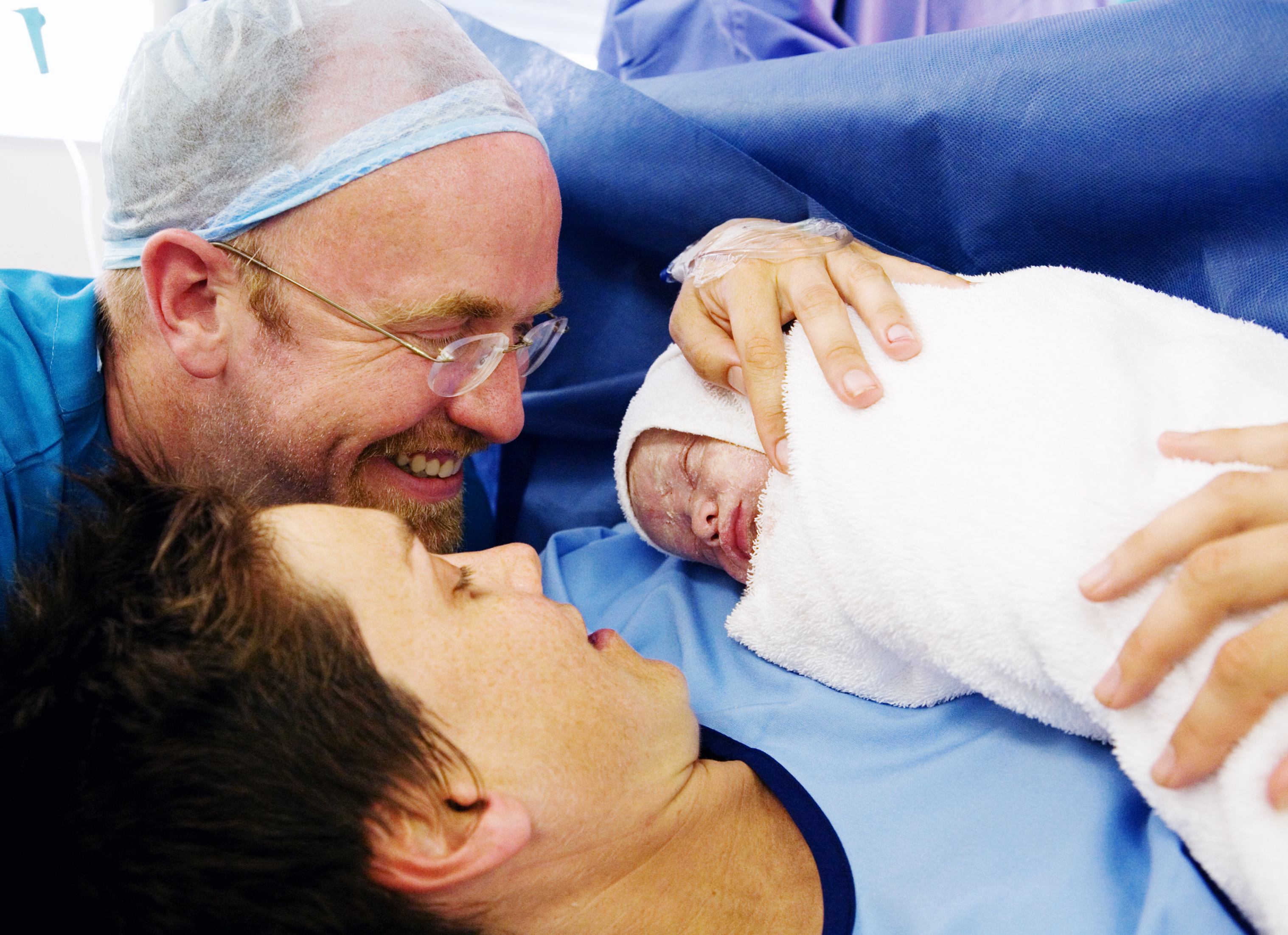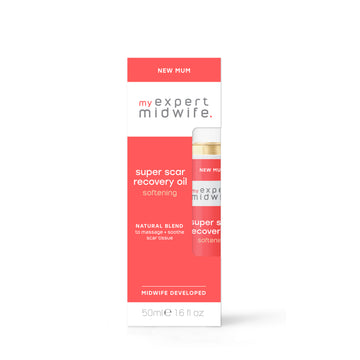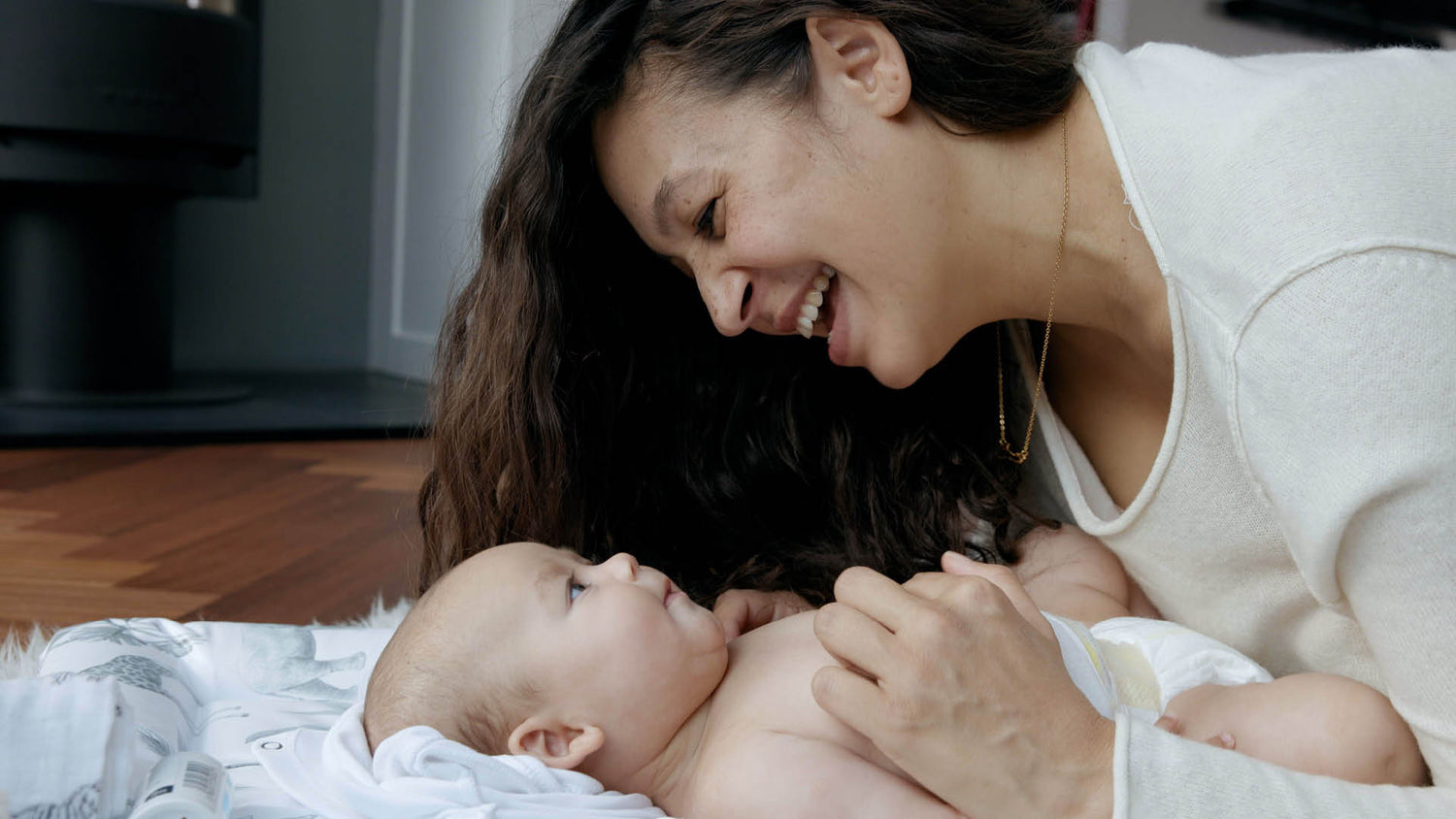If your baby is born via emergency (or unplanned) Caesarean section, your feelings can be complex. You could be wondering why you needed a C-section and if there was anything you or your medical team could have done differently to prevent this from happening. You may feel that your birth was very different to what you had planned and envisioned in your birth plan. You may also experience feelings of being unheard, ignored, coerced or frightened. You can be struggling after a C-section and feel upset and want to rewind the clock to put things right so you don’t miss out on an experience that was important to you.
What happens in an emergency C-section?
An emergency C-section is a Caesarean section that has not been planned by you and your obstetrician (doctor) during your pregnancy. It is major surgery and happens because it is considered the safest way to birth your baby according to your circumstances. In contrast, an elective C-section will have been discussed, booked (given a date) and consented to well before the procedure.

Common feelings after having an emergency C-section
Lack of control
Even if you have thought during pregnancy that a C-section might be how your baby needs to be born, it can come as quite a shock if it does happen, and this can lead to feelings that events were out of our control. Unplanned C-sections are most likely to occur during labour - a time when you feel at your most vulnerable, but they can also happen before labour starts. You may think that things happened fast, leading to feeling out of control during your birth. Talking to people you trust can help you process these events and make sense of why they happened.
Feeling guilty
It is common to feel guilty about your birth not going how you wanted it to or expected, especially if you wanted a natural birth. Others around you may add to these feelings by saying things like, ‘At least you and your baby are alive and healthy’. Remember, it’s okay to feel upset and grieve for the experience you wanted. Of course, you are grateful for having a healthy baby and being alive - after all, you are most invested in yourself and your baby! But this does not cancel out your right to feel disappointed, and working your way through these feelings may take some time, which is perfectly normal.
Body failure
It is common to feel that your body has failed you when you are unable to give birth vaginally. We may have heard birth stories and seen messages that it is the most natural and normal thing for a woman to give birth vaginally during pregnancy, so this can make you question your body’s abilities. You may even feel your body is broken and not working as it should. Try not to blame your body, as it is likely that the circumstances may have been out of your control. Birth is unpredictable, and many variables in the balance before and during labour could have led to your unplanned C-section.
You may feel traumatised
You may think that you have experienced a traumatic birth. Surgery needs recovery time, but unplanned or emergency surgery needs a significant amount of recovery time for your mind to adjust to what happened. Take things slowly and be gentle with yourself. Find other people, family, friends, or healthcare professionals who can help you process your feelings.
Feeling detached
This is part of processing what has happened to you. You may feel disconnected from your own body or disconnected from your baby. This is part of processing your experiences and is not usually serious but something you need to work through. Again, talking to others you trust who are empathetic towards your situation can help. Search these people out. They may be around you, or you may need to look further afield for professional help or online communities of like-minded people who have had similar experiences.
Feeling angry
Feelings of anger and resentment often can come after those feelings we have already discussed. You may ask yourself what events led to your unplanned C-section, and were they preventable? Could you have done things differently, or could your care have been better? If you feel you have unresolved issues surrounding your unplanned C-section, you can contact your hospital and arrange to talk through these events with a doctor or midwife, who will help explain the sequence of events and if you could have improved things. This can be helpful with processing and understanding what happened during this time.
Emotional recovery after a C-section

C-section birth is major abdominal surgery, and recovery time can vary from one woman to another. After your C-section, you will need to take care when moving about and lifting things. Rest, self-care and nourishment are crucial to recovery and the healing process during this time, especially in the first 24 hours.
Whether you’ve had a planned or emergency C-section, you need to remember that you will likely take longer to heal than vaginal birth. You may find that your movement is more restricted, so you need to take more care when walking around and when getting in and out of bed. Driving after a C-section may also not be possible until you feel you can react quickly - so check with your insurance company.
The first few weeks
Check your wound regularly to make sure it is healing well.
- There should not be any redness, spreading, smells, or oozing from the wound site
- It is normal to have vaginal bleeding after a C-section, but this should become lighter, not heavier, as the days go by after your birth
- A doctor may have used dissolvable stitches, and they will start to dissolve a few days post-birth
- If you are worried about your scar, vaginal bleeding, blood clots, or any other concerns, contact your midwife, GP, or maternity assessment centre for medical advice
- Once your dressing has been removed, and regular wound healing occurs, you can start developing your routine to care for your C-section wound and scar to optimise your recovery
Cleaning your wound area
A shower or bath should be part of your daily wound cleaning routine. If you want to clean the area more often, here is a guide to help:
- Make a hygiene station. This could be a box or tub containing everything you need, such as cotton wool, moist fragrance-free wipes, a mirror, a clean bowl, nappy bags, a small towel, spare sanitary pads and Spritz for Bits
- Fill your bowl with warm water and dampen the cotton wool
- Your section scar will be below your bikini line. So sitting reclining or lying propped up may be most comfortable; you can then gently lift your tummy to expose the wound. You may want someone with you to hold a mirror so you can see it
- Wipe gently in one direction with the dampened cotton wool part way or entirely along your scar and dispose of it into the bag. Use another piece or two if needed
- Try to let the air circulate for a few minutes and pat dry if needed
- Spray on Spritz for Bits for soothing relief
Spritz for Bits
Use Spritz for Bits to help relieve soreness and itchiness during the first few weeks once normal wound healing occurs.
You can use Spritz for Bits to help provide instant relief for an itchy C-section scar anytime you need to. Just make sure you don’t use Spritz for Bits as an alternative to cleaning your wound as per the above recommendations.
Soak for Bits
Soak for Bits is a must-have to add to your bath after childbirth, whether you are recovering from vaginal or caesarean delivery. A regular self-care routine, including a relaxing bath, can contribute to your physical and emotional recovery after a C-section. Make sure your mobility has improved enough after your C-section to move in and out of the bath safely.
Both Spritz for Bits and Soak for Bits are packed with essential oils with anti-inflammatory and anti-bacterial properties to help soothe swelling, bruising whilst also cleaning and protecting the area.
Long-term scar recovery

As scar tissue tends to develop slowly, a regular self-massage routine can help improve the appearance and mobility of both external and internal scar tissue after your C-section.
C-section scars can vary from being quite prominent to almost invisible during healing. As scar tissue forms slowly, using a scar massaging technique can encourage the scar to form flatter and have a less raised appearance externally. Scar massage can help influence the development of scar tissue from as early as the first few weeks to up to 2 years after having a C-section.
Scar tissue also develops internally and may adhere to other tissues creating adhesions, bands of scar tissue that can tighten and constrain internal tissues. These occur most commonly on the colon, ovaries or between the bladder and uterus and can cause pelvic and back pain.
Super Scar Recovery Oil
Once your wound is considered well healed, usually around six weeks post-birth, our Super Scar Recovery Oil is perfect for massaging your C-section scar. It has been specially developed to help improve the appearance and condition of scar tissue through massage.
By following our scar massage guide, you can develop a deeper massage technique at a comfortable pace for you to help reduce the development of tightness created by adhesions. Regular scar massage can help increase mobility around the pelvis and decrease feelings of tension around the scar area.
Where to find support
If you feel low in mood without any improvement, talk to a trusted person close to you and seek help from a qualified professional. If you don’t feel better in the first few months after birth, you could benefit from more support and help. This could be with a specially trained counsellor or psychotherapist to help you develop techniques for managing events. Your GP will be able to signpost you towards resources available in your local area.
Family/friend support
Help from family and friends can often be the first port of call when you need physical and emotional support. Still, if they lack understanding about why you are struggling to process your birth experience, it can be better to seek extra help externally, away from those closest to you.
Support groups
You can try many support groups to see which one(s) are tailored best to your needs. It may have people who have experienced an emergency caesarean like you, or you may feel more comfortable in one specific to mental health awareness. Talking to others with similar feelings and emotions can be a useful starting point, especially for guidance with other available resources.
Professional counselling
Distance from family and friends is more manageable for some people when processing events, and support groups may not work enough for your needs. There are other ways to help, such as counselling and psychotherapy to help your C-section recovery. These services can be accessed via the NHS through your GP or health visitor or search online for services available in your locality through private practices for a fee such as Buick Hamblin Counselling. If you need help urgently, you can ask for this via your GP or A&E if required.
A debrief
You can contact the hospital where you received your care during your pregnancy and birth to request a debrief. This is an appointment for you to sit with a midwife or doctor and review your notes to examine the events during this time. Understanding events during childbirth can clarify situations that have made you anxious and scared. Independent midwives also offer one-off appointments in your own home to explore your birth plan and journey and help you decide how to take things further if you want to.
After you have a thorough understanding of what happened, you may feel as though you want to raise a complaint. You can contact Patient Advice and Liaison Service (PALS).
In summary, recovering from a C-section can present difficulties, but knowing when and where to access the proper support can help you optimise your physical and emotional recovery journey.






